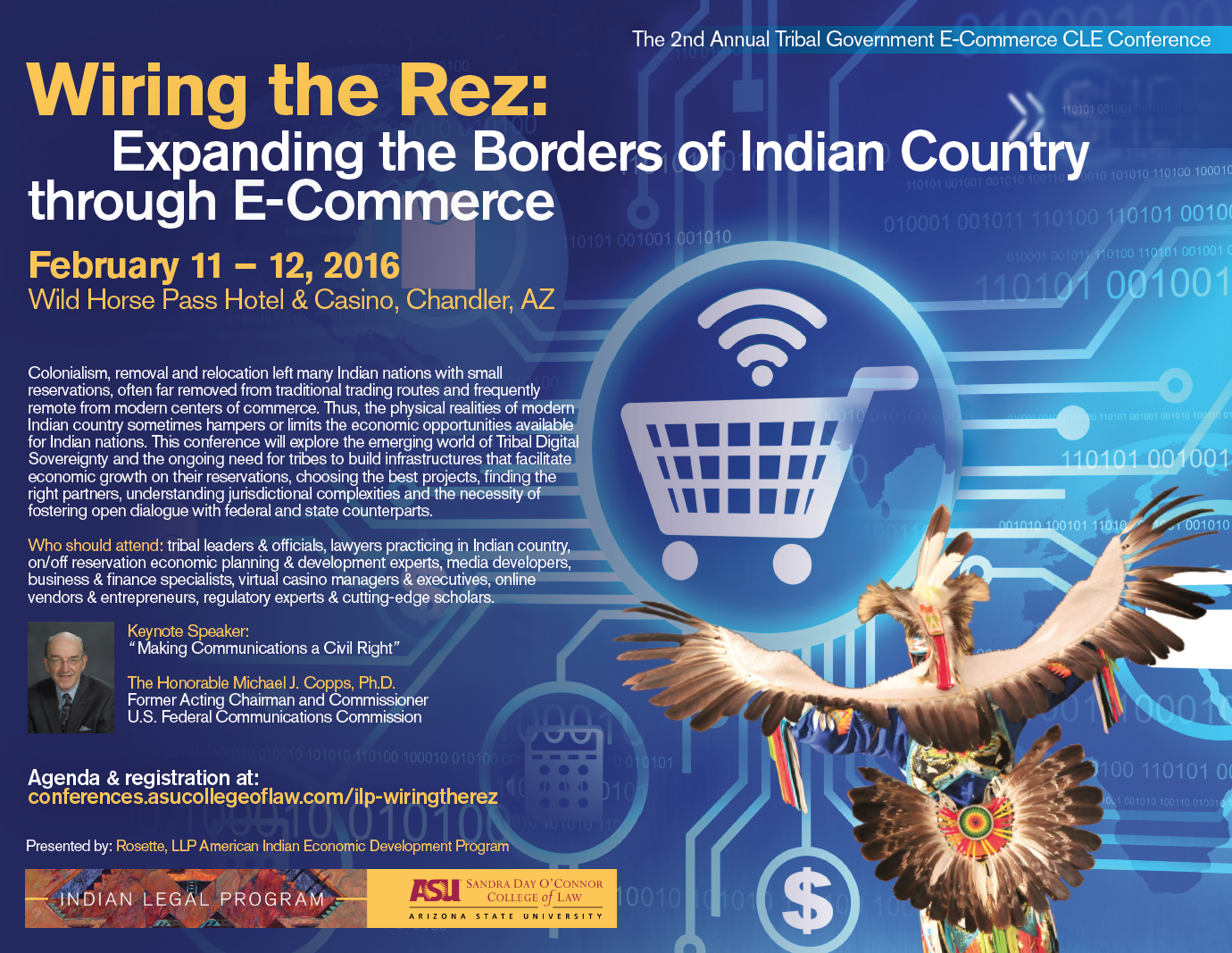
From Indian Country Today: http://indiancountrytodaymedianetwork.com/2016/01/21/tribal-e-commerce-conference-focuses-wiring-rez-163149
The physical realities of modern Indian country sometimes hamper or limit the digital economic opportunities available for Indian nations. With that in mind, the Indian Legal Program at the Sandra Day O’Connor College of Law at Arizona State University is devoting its second annual Tribal E-Commerce CLE Conference to addressing the challenges tribes face in joining the digital revolution.
“Wiring the Rez: Expanding the Borders of Indian Country through E-Commerce” will explore the ongoing need for tribes to build infrastructures that facilitate economic growth on their reservations, choosing the best projects, finding the right partners, understanding jurisdictional complexities, and the necessity of fostering open dialogue with federal and state counterparts, while complying with appropriate federal guidelines.
The conference takes place February 11-12 at the Wild Horse Pass Hotel & Casino in Chandler, Arizona. The Honorable Michael J. Copps, former acting chairman and commissioner of the U.S. Federal Communications Commission (FCC) will be the keynote speaker.
“The digital revolution affords Indian tribes and individual Indian entrepreneurs new and unique opportunities to project their businesses beyond the often remote confines of the reservation boundaries and to develop new business relationships no longer confined to their rez,” said Robert N. Clinton, Foundation Professor of Law and Faculty Fellow for the Center for Law, Science & Innovation at ASU Law. “To avail themselves of these new business prospects, Indian tribes, however, must first wire the rez with the broadband infrastructure necessary to support such e-commerce and then determine what business opportunities the Internet provides.”
The first day of the conference will be devoted to that particular challenge, said Professor Clinton, who will also be a speaker at the event and serves as a co-chair for the Conference Planning Committee.
“Right now, Indian country has a lack of capacity, a lack of technically trained people in this arena,” said Traci Morris, director of the American Indian Policy Institute at ASU, a conference speaker, and a co-chair for the Conference Planning Committee. “We have rural, rugged lands that are often difficult to reach. Some areas still don’t have 911 because you can’t get phone lines out there.”
Morris, who has advocated for digital inclusion at the FCC and on Capitol Hill, said one of the major infrastructure challenges facing Indian country is that a one-size-fits-all solution is not possible. Each of the nation’s 567 tribes will have their own unique issues.
“The goal is to do what works for each individual community and what they need to get connectivity,” she said. “For some communities it will be building their own infrastructures. For others it may be a hybrid of their own infrastructure tapping into lines from a larger telecomm company. For other communities, it may just be making sure the telecomm companies serve them.”
The second day of the conference will explore various e-commerce and telecommunications opportunities on which Indian nations have seized upon to build their economies and provide jobs and necessary governmental resources for their people, including telecommunications and broadcast industries, financial services, Internet gaming, and online sales.
Morris hopes the conference will help start the process of creating a pipeline for Native law students to enter the relatively new field of Indian country telecommunications regulatory issues.
The Tribal E-Commerce Conference couldn’t come at a more critical time for Indian country, said Geoffrey C. Blackwell, chief strategy officer and general counsel for Amerind Risk.
Before joining Amerind Risk, Blackwell, who is also speaking at the conference, was a senior policy maker and Office Chief at the FCC. He established the FCC’s Office of Native Affairs and Policy and, for over five years, directed FCC activities to incentivize the deployment of broadband and communications technologies across Indian country. Blackwell also led the FCC’s efforts to protect tribal sacred sites and cultural resources, ensure low income families on tribal lands have telephone and broadband services, and prioritize radio and television broadcasting media ownership opportunities for tribal nations.
“There is a persistent digital divide in Indian country, and over the years it has become more complex, diversified, and recalcitrant,” Blackwell said. “With this conference, we will get together to discuss how the issues of deployment and adoption have been addressed before, as well as new ways of working to bring services to Indian country. While electricity and water were the most important infrastructures of the 20th century, the most critical of infrastructures in the 21st century is communications technology. Broadband Internet brings all the benefits of modern society to the doors of our homes in Indian country—education, health care, public safety, civic engagement, and of course, economic empowerment.
“So much more in education in the United States is going online—not just teaching, but also testing— that there is much at risk without modern communication technologies in our tribal communities, and most importantly, to our children who will fall even further behind without robust connectivity.”
This conference is being hosted by ILP’s Rosette, LLP American Indian Economic Development Program and ASU’s American Indian Policy Institute. For registration and more information, visit the E-Commerce Official Website. Early registration ends January 29.
Read more at http://indiancountrytodaymedianetwork.com/2016/01/21/tribal-e-commerce-conference-focuses-wiring-rez-163149